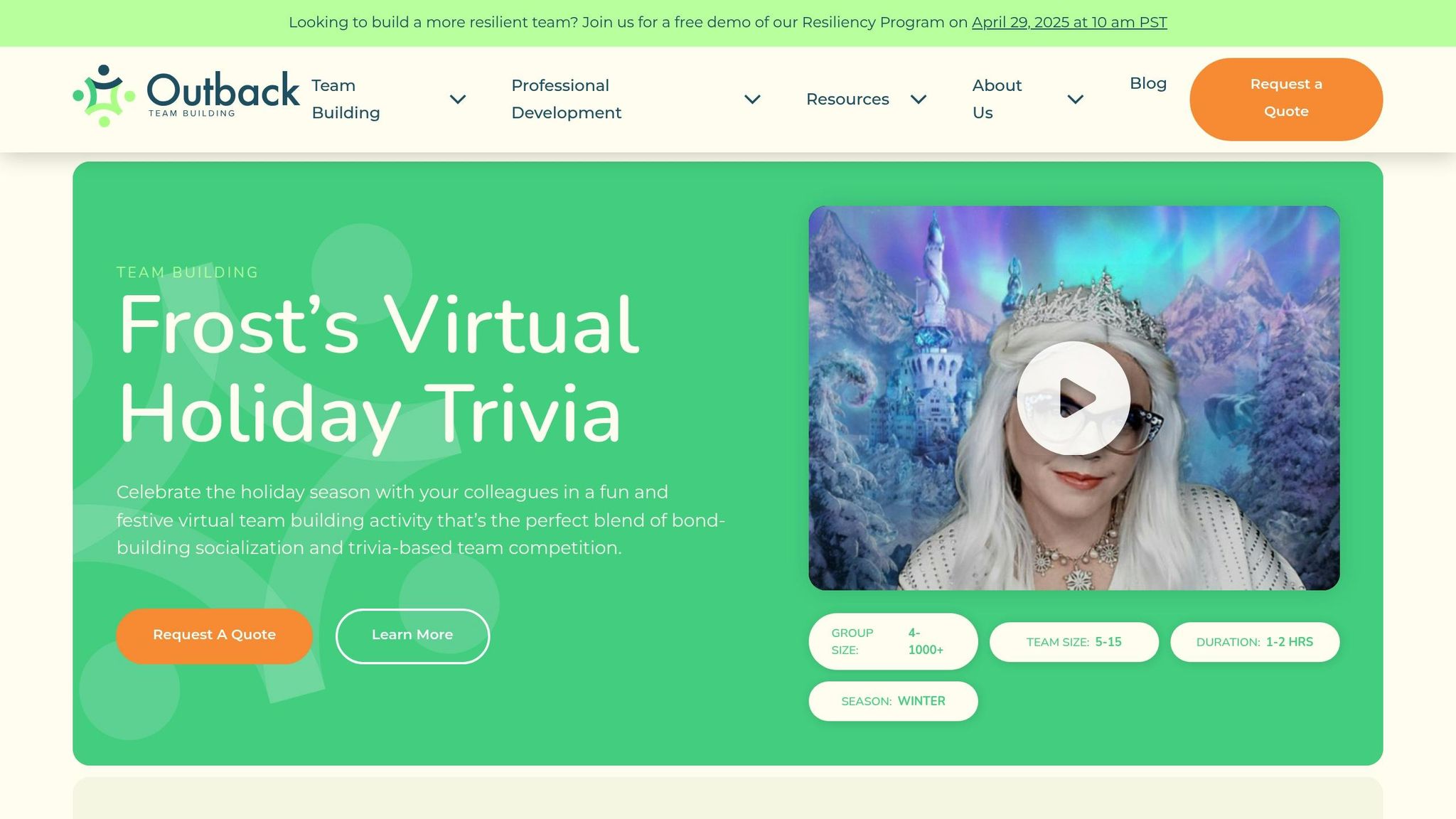Choosing between team play and individual play for your Christmas trivia event? Here’s a quick summary to help you decide:
- Team Play: Ideal for larger groups and fostering collaboration. It works well in both in-person and virtual settings, offering opportunities for teamwork and shared knowledge. However, it may require more time and careful group dynamics management.
- Individual Play: Best for smaller groups or fast-paced events. It’s simple to set up and emphasizes personal competition, but can feel isolating and put pressure on individuals.
Key considerations:
- Group Size: Teams suit large groups; individual play works for smaller ones.
- Event Duration: Teams need more time; individuals keep the pace brisk.
- Interaction: Teams encourage collaboration; individual play focuses on competition.
Quick Comparison Table:
| Feature | Team Play | Individual Play |
|---|---|---|
| Group Size | Large | Small |
| Pace | Slower | Faster |
| Engagement | Collaborative | Competitive |
| Setup Complexity | Higher (needs coordination) | Lower (straightforward) |
| Social Interaction | High | Low |
Choose the format that fits your group size, event goals, and energy level to create a fun and engaging holiday trivia experience.
Frost’s Virtual Holiday Trivia – Virtual Holiday Team Building …

Team Play Format
Depending on the group size and venue, team-based Christmas trivia can encourage teamwork and camaraderie, whether in person or online.
Why Team Play Works
Team play encourages collaboration and strengthens connections. It allows players to combine their knowledge across various Christmas trivia topics. For example, one team member might excel at holiday movie trivia, while another knows all about festive traditions. This mix of skills creates a well-rounded and enjoyable experience. To keep things running smoothly, stick to teams of 4–6 players, set time limits for discussions, assign a spokesperson, and keep track of scores.
In virtual trivia games, team formats offer unique advantages:
- Breakout rooms for private team discussions
- Opportunities for players with different expertise to learn from each other
- Less pressure on individuals, as the group shares responsibility
- Increased engagement through lively team discussions
Challenges of Team Play
Uneven Participation: Rotate spokesperson duties and encourage everyone to contribute.
Time Constraints: Use strict time limits with clear signals for when to start and stop.
Team Dynamics: Form balanced groups and establish rules for respectful communication.
Next, we’ll dive into how individual play brings a quicker pace and a personal challenge.
Individual Play Format
After discussing team-based dynamics, let’s dive into individual play. This format shifts the focus to a faster, more competitive experience where each person’s Christmas knowledge is put to the test. It brings a high-energy vibe and requires participants to take full responsibility for their performance.
Benefits of Individual Play
This format stands out for its speed, simplicity, and straightforward scoring, making it a great choice for smaller groups of 5–15 participants. Here are the main perks:
- Quick rounds: Each round lasts just 15–30 seconds, keeping the pace lively.
- Clear scoring: Everyone’s performance is tracked individually, ensuring transparency.
- Easy setup online: No need to worry about creating breakout rooms.
Limitations of Individual Play
While individual play has its strengths, it does come with a few challenges. Here’s how to address them:
- Spotlight pressure: Some participants might feel anxious being in the spotlight. To ease this, use written or multiple-choice answers.
- Less social interaction: It can feel isolating. Add short breaks or bonus rounds to encourage mingling.
- Uneven category knowledge: Not everyone will excel in every category. Offer hints that cost partial points to balance the difficulty.
To keep the energy high and avoid burnout, aim for short rounds lasting 15–20 minutes.
Next, we’ll compare these formats side by side in the following chart.
sbb-itb-df5c804
Format Comparison Chart
Here’s a quick look at how formats differ:
- Setup Complexity: Teams need to organize group discussions and manage strategies, while individuals only require simple rules and materials.
- Interaction & Engagement: Teams focus on collaboration through strategy sessions, whereas solo players compete head-to-head.
- Scoring Transparency: Teams combine their knowledge and share points, while individuals track their own progress and achievements.
These insights can help you decide which format works best for your event.
Selecting Your Game Format
After checking out the format comparison chart, think about these factors to decide on the best setup for your game:
Event Purpose
- Team play: Great for building teamwork during family reunions or team-building events.
- Individual play: Perfect for sparking friendly competition at game nights or contests.
- Participant dynamics: Teams can help balance different skill levels, while solo play works well for groups with evenly matched abilities.
Resources
- Ready-to-use Trivia About Christmas packs include over 40 themed questions available in PDF or PowerPoint, making them versatile for both formats.
- Opt for a team format to encourage collaboration or go with individual play to ramp up the competitive energy.
Summary
Opt for team play to encourage collaboration and shared knowledge, or go with individual play for a more fast-paced, competitive vibe. Our collection includes over 40 question packs available in PDF and PowerPoint formats, designed to work perfectly with either option. Tailor your choice based on group size, energy levels, and preferences to create an entertaining and lively trivia experience.
FAQs
How can I create a fun and balanced team dynamic for a Christmas trivia game?
Creating a fun and balanced team dynamic for a Christmas trivia game can make the event more enjoyable for everyone. Here are a few tips:
- Mix skill levels and interests: Combine players with different strengths, such as knowledge of Christmas movies, music, or traditions, to ensure teams are well-rounded.
- Keep teams small: Groups of 3–5 people are ideal to encourage participation without overwhelming quieter players.
- Rotate roles: Assign rotating roles like team captain or spokesperson to give everyone a chance to contribute and lead.
By fostering collaboration and ensuring everyone feels included, you’ll create a spirited and memorable trivia experience for all participants!
How can I make individual Christmas trivia games more social and engaging?
To make individual Christmas trivia games more social, consider incorporating activities that encourage interaction. For example, after each question, allow players to discuss their answers with others before revealing the correct one. You can also include a few group challenges or bonus rounds where participants collaborate briefly, even in an individual format.
Adding light-hearted commentary, fun facts, or holiday-themed jokes between questions can also create a lively atmosphere and keep everyone engaged. Remember, the goal is to make the experience enjoyable and festive for everyone involved!
What are the best resources for hosting team or individual Christmas trivia games?
For hosting Christmas trivia games, ready-to-use trivia packs are available in PDF and PowerPoint formats. These packs include over 40 themed questions covering topics like Christmas movies, music, and traditions. They are perfect for trivia nights at home, bars, or virtual events and come with instant email delivery for quick setup.






